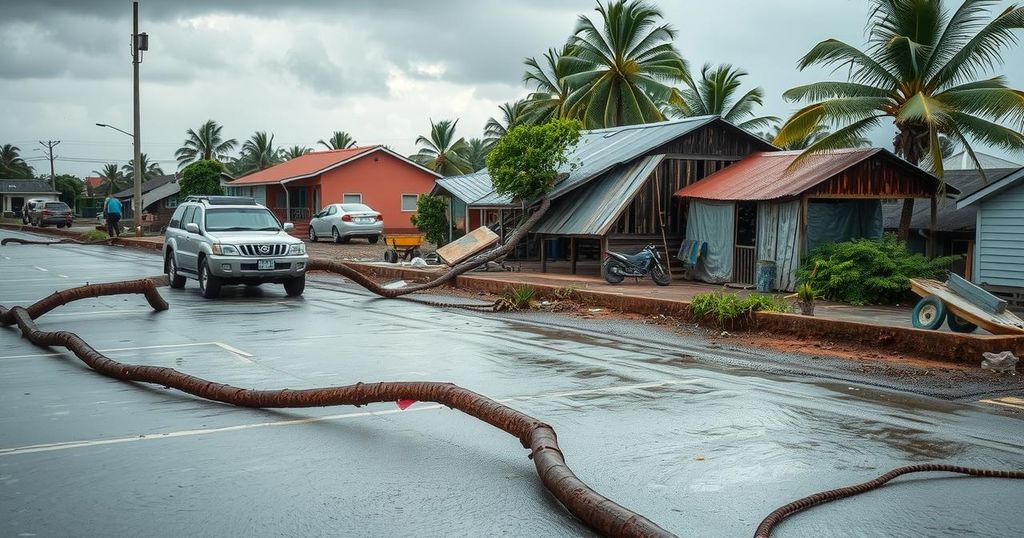Cyclone Chido’s Devastation: 90,000 Children Affected in Mozambique

Tropical Cyclone Chido has severely affected northern Mozambique, displacing thousands and impacting around 90,000 children. The storm caused extensive damage to homes, schools, and health facilities, further exacerbating existing humanitarian crises in a region already vulnerable to conflict and climate change. Both UNICEF and UNHCR have initiated emergency responses to provide support to those in need, amidst significant challenges in the area.
Tropical Cyclone Chido has significantly impacted northern Mozambique, particularly in Cabo Delgado province, leading to severe destruction and displacement. Approximately 90,000 children are among the estimated 174,000 individuals affected, with over 35,000 homes damaged or destroyed, according to the United Nations Children’s Fund (UNICEF). The cyclone’s aftermath includes the destruction of at least 186,000 classrooms and damage to 20 health facilities, compounding the already dire conditions in the region due to ongoing conflicts and public health crises.
Cyclone Chido made landfall near Pemba, resulting in widespread damage to infrastructure, including roofs, communication systems, and electricity. Mary Louise Eagleton, UNICEF Representative in Mozambique, remarked, “Mozambique is considered one of the most affected countries in the world by climate change, and children were already experiencing several life-threatening emergencies before Cyclone Chido, including conflict, drought, and disease outbreaks.” Therefore, emergency humanitarian efforts initiated by UNICEF and various UN partners aim to mitigate the impact on the vulnerable population.
The province has endured over seven years of conflict, displacing 1.3 million individuals, 80% of whom are women and children. Cyclone Chido reinstates hardship for these displaced families, washing away their minimal reconstructive efforts. Similar devastation was also observed in neighboring Nampula and Niassa provinces, where approximately 25,000 families lost electricity, and two water facilities were damaged, exacerbating an existing cholera outbreak.
The UN High Commissioner for Refugees (UNHCR) has commenced response efforts, providing emergency relief in Pemba immediate after the storm, benefiting 2,600 individuals with essential supplies. UNHCR spokesperson Eujin Byun indicated that about 190,000 people require urgent humanitarian assistance based on preliminary assessments.
The Secretary-General of the United Nations, António Guterres, confirmed the organization’s commitment to providing necessary support. Meanwhile, the Office for the Coordination of Humanitarian Affairs (OCHA) announced a $4 million allocation to initiate humanitarian responses. Concurrently, the World Food Programme (WFP) plans to scale up efforts as nearly 3.3 million Mozambicans are projected to face elevated levels of food insecurity in the upcoming year.
The cyclone also affected the French overseas territory Mayotte, resulting in adverse conditions for vulnerable populations, and similarly, southern Malawi experienced extensive damage due to the storm’s fiercest winds and rains, prompting ongoing monitoring and coordination by UN agencies in the area.
Cyclone Chido hit Mozambique amid a backdrop of recurring climate challenges, contributing to humanitarian crises. Mozambique is among the globe’s most vulnerable nations to climate-related disasters, positioning its population—particularly children—at significant risks from a range of emergencies, including conflict, disease, and natural disasters. Ongoing instability in Cabo Delgado, exacerbated by recent violent conflicts, complicates relief efforts and increases the urgency for effective humanitarian intervention to safeguard vulnerable communities.
In conclusion, Cyclone Chido has wrought considerable devastation in Mozambique, affecting tens of thousands of children and displacing many families amidst an already challenging humanitarian landscape. The ongoing response from UNICEF and UN partners highlights the critical need for comprehensive relief efforts, addressing immediate needs while also considering long-term recovery strategies to support communities that have faced persistent adversity due to conflict and climate change. Continued international assistance and coordinated efforts are necessary to ameliorate the impact of such natural disasters in the future.
Original Source: news.un.org






